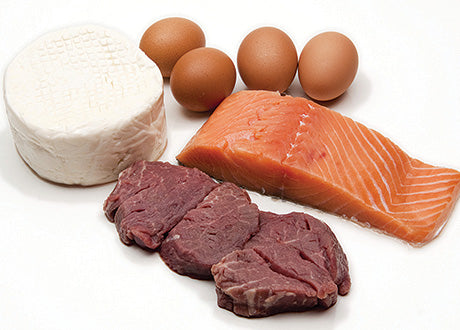Feeling sluggish, lethargic, tired, and drained? What we choose as fuel impacts the performance of our bodies. We can fight fatigue by eating the right kinds of food.
Feeling sluggish, lethargic, tired, and drained? What we choose as fuel impacts the performance of our bodies. We can fight fatigue by eating the right kinds of food.
Early Morning Dose
At the beginning of the day, many people leave for work or school without eating a proper meal. By mid-morning, people find themselves tired and sometimes unable to stay focused.

Breakfast improves alertness and concentration, helps shed pounds by preventing overeating during the day, and prevents obesity, diabetes, and heart disease. To prepare the body for the day, start by eating carbohydrates for energy and protein for endurance.
Try eating…
- Whole grain bagel with cheese
- Cereal with fruit and yogurt
- Whole grain toast with peanut butter and fruit
- Hard-broiled egg sliced into a whole wheat pita
- Scrambled eggs, toast, and fruit
- Oatmeal with raisins
- Breakfast bars
- Breakfast sandwiches
- Oatmeal packets
Carbohydrates
The best way to maximize the body’s potential for energy is to eat a combination of complex and simple carbohydrates.

Complex carbohydrates, which are slow burning, should make up the bulk of the carbohydrates we eat. They are stored in the muscles and liver for energy and burns slower than simple carbohydrates. Foods containing complex carbohydrates include whole grains and starchy vegetables like potatoes, squash, pumpkins, and carrots.
It is also important our food has lots of fiber to help slow down the process of absorbing complex carbohydrates in our body. Therefore, the body gets a more balanced release of energy as opposed to the quick burst of energy.
Simple carbohydrates with a faster burn can provide an immediate source of energy and can be found in foods like fruits, vegetables, and honey. Simple sugars found in candy bars, soft drinks, and cookies can also provide a quick boost of energy, followed by a crash afterwards.
Fat
Bad fat is usually associated with heart disease, some types of cancer, and chronic illnesses. Saturated fats such as meat, butter, lard, and cream are just a few to avoid. Trans fats found in baked goods, snack foods, fried foods, and margarines, can all increase the risk of heart disease.

Monounsaturated and polyunsaturated fats are two types of unsaturated fatty acids that derive from vegetables and plants. Monounsaturated fats are liquid at room temperature but begin to solidify at cold temperatures. This type of fat is preferable to other types of fat and can be found in olives, olive oil, nuts, peanut oil, canola oil and avocados. Some studies have shown that these kinds of fats can actually lower LDL (bad) cholesterol and maintain HDL (good) cholesterol.

Polyunsaturated fats are also liquid at room temperature. These are found in sesame, corn, cottonseed and soybean oils. This type of fat has also been shown to reduce levels of LDL cholesterol, but too much can also lower your HDL cholesterol.
Fat provides the main fuel source for long duration, low to moderate intensity exercise (endurance sports such as marathons). Even during high intensity exercise, where carbohydrate is the main fuel source, fat is needed to help access the stored carbohydrate (glycogen).
Athletes need to carefully time when they eat fat, how much they eat, and the type of fat they eat. In general, it’s not a good idea to eat fat immediately before or during intense exercise.
Protein
Protein helps regulate the release of energy and maintains cells, assists in muscle growth, transports hormones and vitamins, and preserves lean muscle mass. Proteins are also needed to maintain a good immune system.

Good sources of protein include lean meats, poultry, fish, eggs, beans, nuts, soy, and low-fat dairy products.
In diets where the body does not get its usual fuel of carbohydrates and fat, protein provides the body energy.
However, be wary of over-eating since excess protein will be stored as fat. Without exercise, the fat will continue to increase and may also result in osteoporosis and kidney stones.
Water
Two-thirds of your body is made up of water. The fluid helps control body temperature through sweat, moves food through the intestines, and greases the joints. It is also an essential ingredient in the product of energy molecules. If you’re not well hydrated, your body puts its resources into maintaining your water balance instead of into giving you energy.

In general, the Institute of Medicine recommends that women get about 11 cups of water from food and drink each day, and men get about 16 cups daily. 20% of the liquid generally comes from food and the other 80% from drinking water and other beverages. Frozen fruit bars or icy treats are a good idea, especially on a hot and humid day.
Water is especially important after exercising, with certain medicines, and with a high-fiber diet. Avoid soft drinks and carry a water bottle with you on the go.
If you still find yourself sluggish with a well-balanced diet, visit a doctor. Certain diseases, medications, stress, and the lack of sleep or exercise can also contribute to fatigue.








